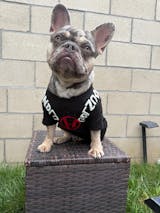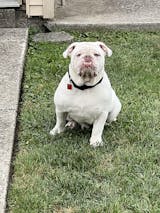New Puppy Parent? Here's your Survival Guide!
So, you've just brought home a new wrinkly puppy! Congratulations! You're in for a lot of fun, love, and laughter. But you're also in for some challenges. Puppies are a lot of work, and if you've never had one before, it can be tough to know where to start. Wrinkly pups, in particular, require a bit of extra care.
We crafted a quick survival guide below for the first 7 days with your new puppy. With just a little bit of preparation, you'll both be off to a great start!

Introducing Your New Puppy to Its New Home:
The first thing you'll want to do is create a safe space for your puppy. This could be a dog crate, exercise pen, or a gated-off area in your home. Put their bedding, toys, food and water bowl in this area. This will be their "den" where they can feel comfortable and relaxed.
If you have other dogs in the house, introduce them slowly. Have each dog smell the other through a baby gate or closed door. Once they seem comfortable, let them meet face-to-face while leashed. Always supervise these interactions until you're confident that everyone gets along.
Our Top Dos:
- As mentioned above, set up a safe, comfortable space for your puppy to sleep and rest. This could be a crate or dog bed in a quiet area of your home.
- Get all the supplies you need before your puppy comes home, including food, bowls, a leash and collar, toys, grooming products and dog waste bags.
- Choose a veterinarian and make an appointment for a check-up within the first week.
- Start working on basic obedience commands like sit, stay, come, down, and leave it.
- Get your puppy used to being handled by gently touching and grooming them all over their body on a daily basis.
- Establish a consistent wrinkle dog care routine.
Our Top Don'ts:
- Don't forget to dog-proof your home! Puppies are curious creatures and will put anything and everything in their mouths. Store away any potential hazards like cleaning products, medications, electrical cords, etc.
- Don't leave your puppy home alone for long periods of time. They will get bored and lonely and may start chewing on things they're not supposed to.
- Don't allow your puppy to jump on you or anyone else. This is a behavior that needs to be corrected early on, or it will become a lifelong habit.
- Don't feed your puppy table scraps or human food. Not only is this bad for their health, but it can also lead to begging behaviors down the road.
- Don't forget to socialize your puppy! Introduce them to as many new people, places, and experiences as possible so they grow up to be confident and well-rounded dogs.
The First Night
The first night home with your new puppy can be tough. They may cry, whimper, or bark through the night, and you might not get much sleep. But there are a few things you can do to make the transition a little bit easier for both of you.
Set up their sleeping area in a quiet room away from the hustle and bustle of the house. This will help them feel safe and secure.
Leave a dog-safe toy or chew in their crate with them to keep them occupied.
Take your puppy out for a final potty break before bedtime.
The First Bath
The first bath is always a bit daunting, but it's important to get your pup used to the process early on. They'll need baths regularly throughout their life, so it's best to start them off on the right foot.
Choose a dog-safe shampoo and have everything you need within arm's reach before getting started.
Place your puppy in the tub and get them wet all over. Be sure to avoid their face and eyes.
Apply hypoallergenic dog shampoo and work it into a lather. Gently massage it into their coat and pay special attention to any problem areas like their underarms, groin, and butt. Rinse your puppy off completely and remove any excess water with a towel. Dry them off with a dog-safe hairdryer set to low or cool. Be extra careful when drying your dog after a bath, making sure to dry their wrinkles thoroughly.
General Tips:
- Puppies need to eat several times a day, so be sure to have a regular feeding schedule.
- Take your puppy out to potty frequently, especially after meals, naps, and playtime.
- Exercise is important for puppies, but don't overdo it. Stick to short walks or indoor play sessions for now.
- Crate training is a great way to help your puppy learn good potty habits and give them a sense of security.
- Be patient! Puppies are a lot of work, but the effort is so worth it in the end. Enjoy this special time with your new furry friend!
- Clean your dog's wrinkles daily with a hypoallergenic dog cleansing wipe such as Squishface Wrinkle Wipes to prevent irritation and infection. Follow with a dog wrinkle cream such as Squishface Wrinkle Paste to keep them moisturized and protected.
The Bottom Line
Puppies are a lot of work but following these tips will help you both survive (and thrive!) during those first 7 days together. As wrinkly puppies require special care, keep an eye out for any signs of infection, such as redness, swelling, discharge, or excessive licking or scratching of the affected area. Just remember to be patient, stay positive, and enjoy this special time with your new pup!
For more tips, tricks, and all things Squishface, don’t forget to visit the blog every week!










